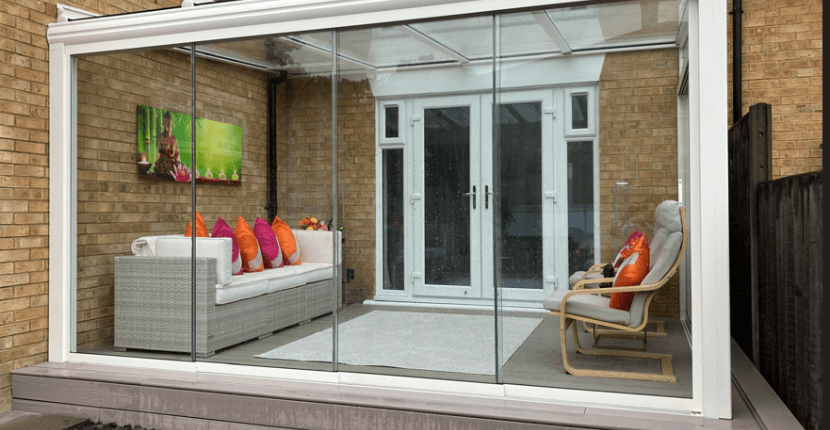
Garden Glass Rooms in Buckinghamshire
Enquire Today For A Free No Obligation Quote
At Garden Glass Rooms, we are the leading provider of bespoke garden glass rooms designed to transform your outdoor space into a year-round living area in Buckinghamshire.
We specialise in creating sleek, modern glass structures that connect your home to nature, offering stunning views, exceptional durability, and versatile functionality.
Whether you’re looking for an elegant space to relax, entertain, or work, our tailored solutions combine premium materials with expert craftsmanship to meet your needs.
Enhance your property’s value, enjoy natural light all year, and make the most of your garden with our custom-built garden glass rooms.
Contact Garden Glass Rooms today for a free consultation and discover how we can bring your vision to life.
How Much Does a Garden Glass Room Cost in Buckinghamshire?
A garden glass room in Buckinghamshire typically costs between £10,000 and £50,000.
The price depends on size, materials, customisation options, and additional features like heating, lighting, or sliding doors.
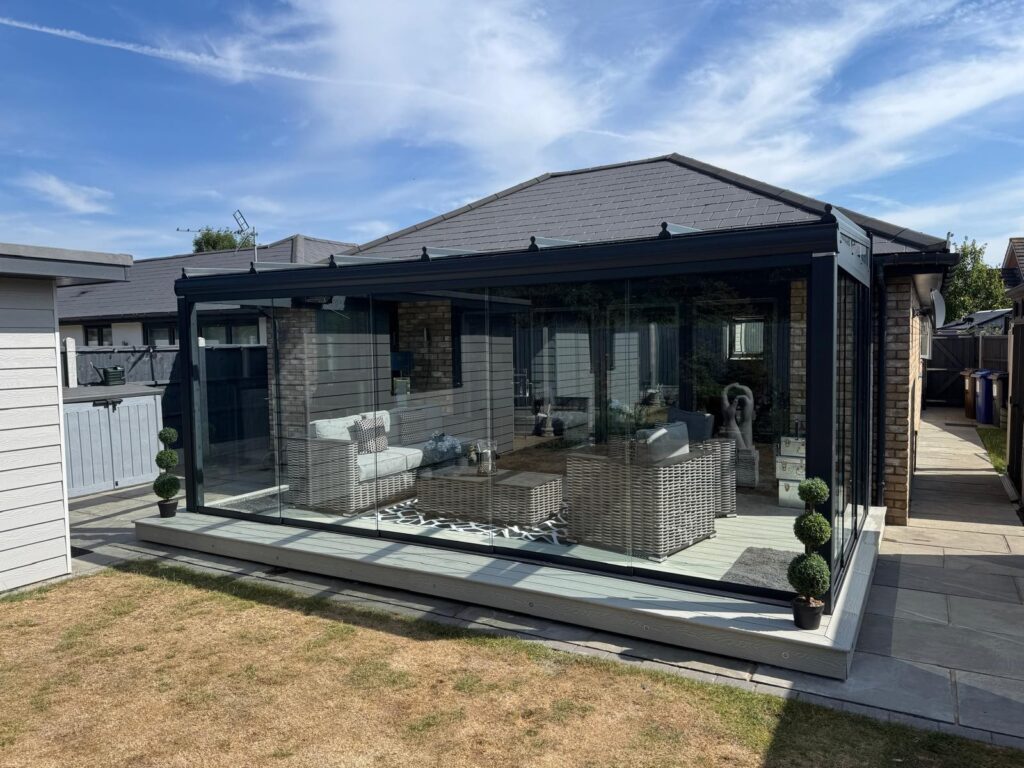
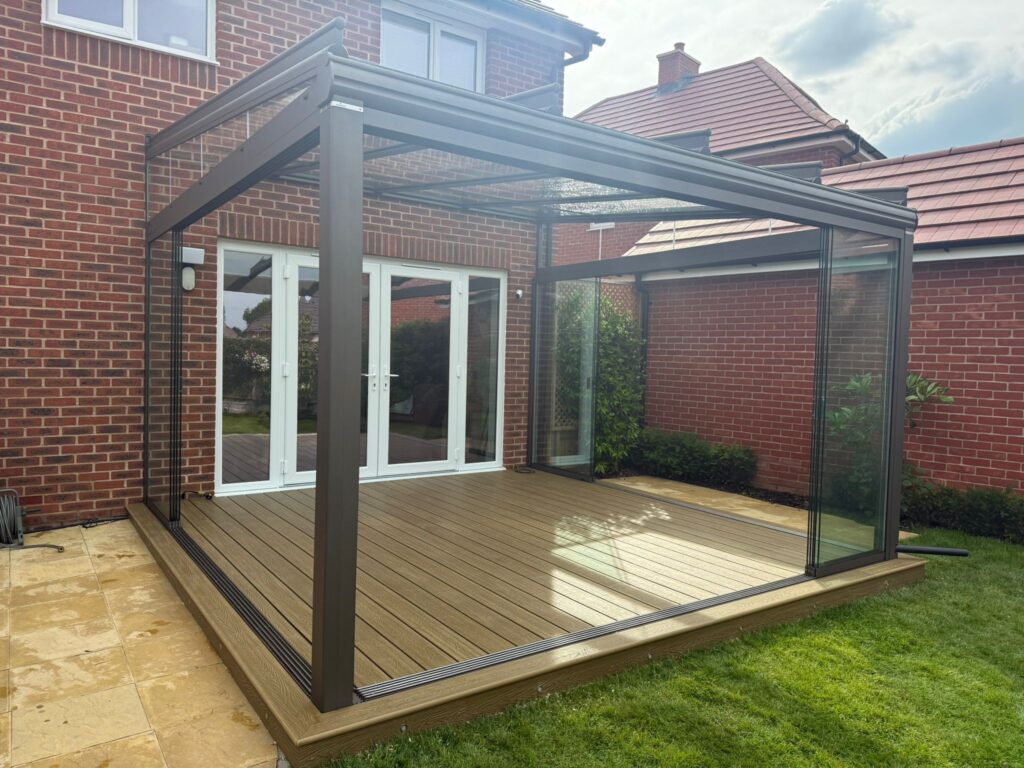
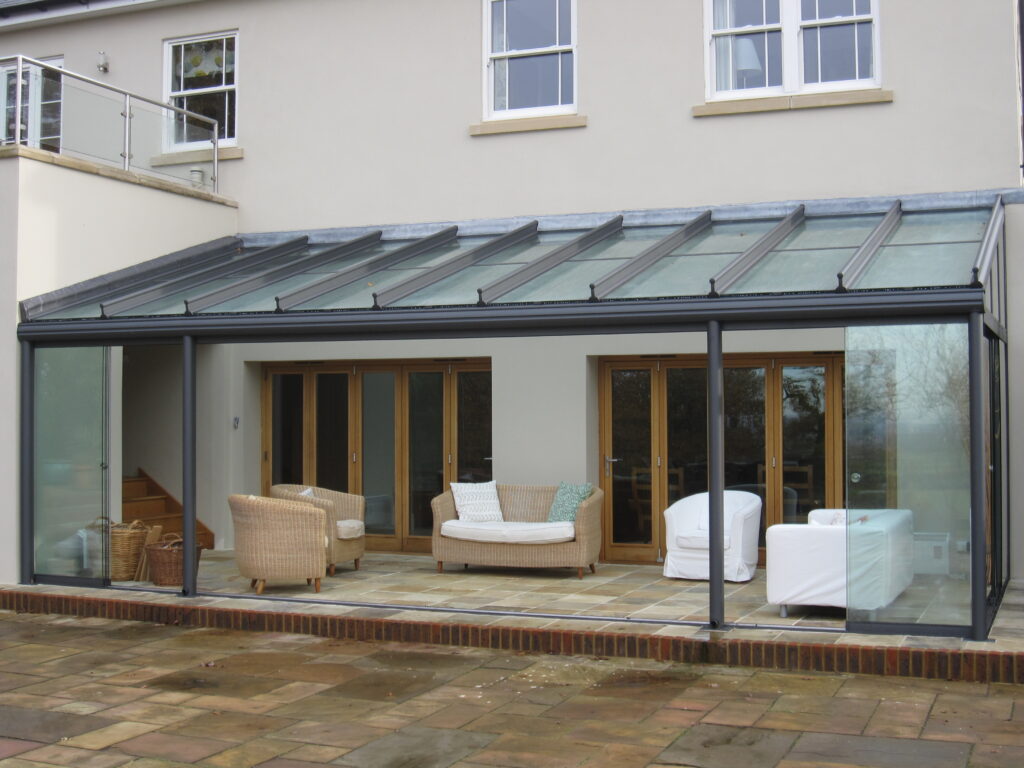
Installation complexity and location also influence the overall cost. For the best pricing, please contact us today for a free, no-obligation quote in Buckinghamshire.
What Are the Benefits of Installing a Glass Garden Room in Buckinghamshire?
Garden glass rooms offer several benefits, enhancing both lifestyle and property value.
Enhanced Outdoor Living Space
A glass garden room in Buckinghamshire provides additional living space that connects your home to the outdoors.
It acts as a bridge between indoor and outdoor areas, allowing you to enjoy the beauty of your garden while staying comfortable inside.
Garden glass rooms can be designed to match your home’s style, ensuring visual continuity and functionality.
This space can be used for leisure, dining, or entertaining guests, creating a multi-purpose area that adds value to your lifestyle.
Year-Round Use
Glass rooms for gardens in Buckinghamshire are usable throughout the year, offering protection from seasonal weather changes. In summer, the glass provides UV protection to prevent excessive heat and sun damage.
Advanced insulation options and heating solutions ensure the room remains warm and cosy during colder months.
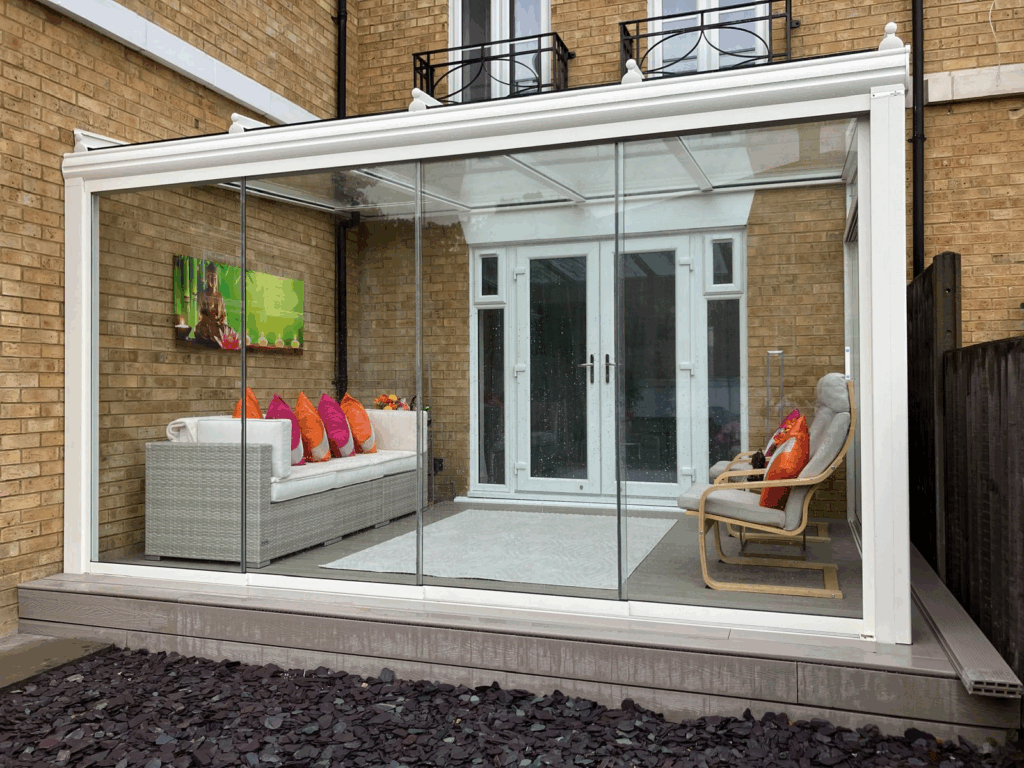
High-quality glass materials, like double or triple glazing, maintain energy efficiency, enabling year-round comfort regardless of external conditions.
Increased Property Value
Installing a garden glass room can increase property value by adding functional and visually appealing space.
It enhances your home’s versatility, which attracts prospective buyers looking for unique features. The additional usable area improves the overall floor plan, making the property stand out in competitive markets.
Moreover, a garden glass room in Buckinghamshire demonstrates quality and modernisation, which buyers often associate with premium homes.
Natural Light Benefits
Garden glass rooms maximise natural light exposure, creating a bright, inviting atmosphere. The abundance of daylight reduces the need for artificial lighting, lowering energy consumption and utility costs.
Natural light also has proven mental and physical health benefits, such as improving mood, increasing productivity, and boosting vitamin D levels.
The sunlight exposure within the glass room creates an ideal environment for growing plants, allowing homeowners to curate indoor gardens or greenery.
Versatile Functionality
A glass room in Buckinghamshire offers versatile functionality, enabling it to adapt to various uses based on your needs.
It can serve as a dining room for family gatherings, a home office for remote work, a private gym for exercise, or a relaxation space to unwind and enjoy nature.
Its flexibility means it can evolve with your lifestyle, accommodating new hobbies or purposes. The customisable design allows you to tailor lighting, flooring, and furniture to suit its intended function.
Improved Aesthetic Appeal
Garden glass rooms in Buckinghamshire enhance the aesthetic appeal of both your home and garden. Their sleek, modern designs provide an elegant addition that complements traditional and contemporary properties alike.
The transparent glass structure creates a seamless connection with the outdoor landscape, offering uninterrupted views of your garden.
This integration enhances the beauty of your space, turning the garden glass room into a stylish focal point. The improved visual appeal adds a sense of sophistication and luxury to your property.
What Materials Are Used to Build Garden Glass Rooms?
Garden glass rooms use high-quality, durable materials for weather resistance and aesthetic appeal.
- Aluminium Glass Rooms in Buckinghamshire: Aluminium frames are commonly used for garden glass rooms due to their durability, lightweight nature, and resistance to rust or corrosion. Aluminium garden rooms in Buckinghamshire also offer a sleek, modern appearance and require minimal maintenance.
- Glass Garden Rooms in Buckinghamshire: High-quality glass, such as double or triple glazing, is used for walls, roofs, and windows. These options provide thermal insulation, UV protection, and sound reduction. Tinted or self-cleaning glass can also be included for added functionality.
- uPVC Garden Rooms in Buckinghamshire: uPVC frames offer a cost-effective and low-maintenance alternative to aluminium. They are energy-efficient, weather-resistant, and available in various finishes and colours to suit different designs.
- Steel Garden Rooms in Buckinghamshire: Steel frames provide exceptional strength and stability for larger or more complex garden glass room structures. Although heavier than aluminium, steel offers excellent load-bearing capacity and a classic, industrial aesthetic.
- Timber Garden Rooms in Buckinghamshire: Timber frames add a natural, traditional look to garden glass rooms. Hardwood options like oak are durable and provide excellent insulation, though they require regular maintenance to protect against weathering.
- Polycarbonate Panels Garden Rooms in Buckinghamshire: Polycarbonate panels are sometimes used for roofing as a lightweight and affordable alternative to glass. They provide UV protection and insulation but may not offer the same clarity and lifespan as glass.
- Composite Material Garden Rooms in Buckinghamshire: Some garden glass rooms use composite materials that combine wood and plastic for improved durability, low maintenance, and enhanced visual appeal.
- Sealants and Insulation: High-performance sealants and insulation materials ensure weatherproofing, energy efficiency, and a comfortable indoor environment throughout the year.
Can Garden Glass Rooms Be Used Year-Round?
Garden glass rooms in Buckinghamshire can be used year-round with the right materials and features. High-quality double or triple-glazed glass ensures thermal insulation, keeping the space warm in winter and cool in summer.
Advanced options, such as UV-protective glass, reduce heat build-up during sunny months while heating systems like underfloor heating or electric radiators provide warmth in colder seasons.
Proper ventilation, insulation, and weatherproof seals ensure comfort by preventing drafts, condensation, and temperature fluctuations.
By incorporating these elements, a garden glass room becomes a functional and enjoyable space throughout all seasons, regardless of weather conditions.
How Do Garden Glass Rooms Compare to Conservatories?
Garden glass rooms differ from conservatories in design, structure, and functionality.
Design and Aesthetic
Garden glass rooms feature a sleek, modern design with minimal framing and large glass panels that connect seamlessly to the outdoors.
The focus is on maximising natural light and providing uninterrupted views of the surrounding garden, making them visually minimalist and contemporary.
Conservatories often have more traditional designs with visible framework, decorative features like finials, and pitched roofs.
The aesthetic of conservatories tends to suit period or classic homes, while garden glass rooms in Buckinghamshire offer a more modern, open-plan feel that complements contemporary properties.
Functionality
Garden glass rooms are primarily designed to function as flexible, open spaces that blur the boundary between indoor and outdoor areas.
They are ideal for seasonal use, serving as spaces for dining, relaxing, or entertaining guests in a sheltered environment while enjoying the garden.
Garden glass rooms can also be left open or closed depending on weather conditions, allowing for ventilation and adaptability.
Conservatories, on the other hand, function as fully enclosed extensions of the home. They are often used as additional living spaces, such as lounges, offices, or dining rooms, and offer more insulation and protection from the elements year-round.
Materials
Garden glass rooms typically use lightweight, durable materials such as aluminium or steel for the frames.
These materials are chosen for their modern aesthetic, minimal maintenance, and resistance to weathering.
The walls and roofs are made of high-quality glazing, often featuring double or triple-glazed glass for insulation and UV protection.
Conservatories, however, may use a wider variety of materials, including uPVC, timber, or aluminium. Timber frames give conservatories a traditional appearance but require regular maintenance.
For roofing, conservatories may incorporate polycarbonate panels or specialised glazed roofs, which can sometimes limit natural light compared to a garden glass room’s design.
Thermal Performance
Garden glass rooms are primarily designed to maximise light and offer an outdoor feel, relying on high-performance glass for temperature regulation.
While double or triple-glazed panels provide insulation, garden glass rooms may not retain heat as effectively as conservatories without additional heating or insulation features.
As a result, garden glass rooms are better suited for seasonal or occasional use unless upgraded with thermal solutions such as underfloor heating or integrated heating systems.
Conservatories are often constructed with enhanced insulation in walls, roofs, and flooring, making them better equipped for year-round use.
Many conservatories also include central heating, ventilation systems, and insulated roofing materials to maintain a consistent temperature in all seasons.
Glass Garden Room Maintenance in Buckinghamshire
Garden glass boxes in Buckinghamshire require minimal maintenance because of their modern materials and design. Aluminium or steel frames are highly durable and weather-resistant, and large glass panels often feature self-cleaning coatings that reduce the need for frequent cleaning.
The simplicity of the structure, with fewer joints and framework, makes upkeep straightforward. In comparison, conservatories may require more maintenance depending on the materials used.
Timber frames need regular treatments to protect against weather damage, while uPVC may discolour over time and require periodic cleaning.
Polycarbonate roofing, common in older conservatories, is prone to algae build-up and may require frequent cleaning or replacement.
Planning Permission
Garden glass rooms are often classified as temporary structures or outdoor installations. As a result, they may not require planning permission if they meet certain criteria, such as size restrictions and proximity to property boundaries. This makes garden glass rooms a faster and easier option for installation.
However, checking with local authorities to confirm specific regulations is still advisable. Conservatories, being more permanent extensions of the home, are subject to stricter planning permissions and building regulations.
Depending on their size, height, and proximity to other structures, conservatories may require formal approval, which can add time and cost to the project.
What Customisation Options Are Available for Garden Glass Rooms?
Garden glass rooms can be tailored to individual preferences with various options.
- Glazing Types: Options include tinted, UV-protected, or self-cleaning glass.
- Roof Styles: Fixed, retractable, or sloped designs to suit specific needs.
- Doors: Sliding, bi-fold, or pivot doors for easy access.
- Lighting: Integrated LED strips, spotlights, or ambient lighting for evening use.
- Additional Features: Heating systems, blinds, or integrated speakers for enhanced functionality.
Garden glass boxes in Buckinghamshire can be fully customised to meet your requirements, please contact us for more information.
What Design Styles Are Popular for Garden Glass Rooms?
Popular garden glass room styles focus on minimalism and blending seamlessly with outdoor spaces.
- Modern Minimalist: Frameless glass panels and clean lines for a sleek, contemporary look.
- Integrated Designs: Structures that match the architectural style of the home.
- Open-Air Systems: Retractable panels or sliding doors for versatile indoor-outdoor spaces.
- Nature-Inspired: Incorporating green roofs or natural wood elements for harmony with the garden.
Do Garden Glass Rooms Require Planning Permission in Buckinghamshire?
In most cases, garden glass rooms do not require planning permission if they meet permitted development criteria in Buckinghamshire.
These criteria include staying within size limits, not exceeding a certain height, and ensuring the structure is not built on designated land.
However, regulations vary by location, and listed properties or conservation areas may require approval. Homeowners should consult local planning authorities to confirm requirements.
How Do Garden Glass Rooms Enhance Property Value?
Garden glass rooms can significantly increase property value by adding desirable living space and aesthetic appeal.
The modern design, natural light, and seamless outdoor connection make these structures attractive to potential buyers.
High-quality materials and versatile usage further contribute to the investment’s long-term value.
What Are the Heating and Insulation Options for Garden Glass Rooms?
Heating and insulation options make garden glass rooms comfortable in any climate.
- Heating: Options include underfloor heating, electric radiators, or infrared heaters for efficient warmth.
- Insulation: Double or triple glazing, thermal breaks in frames, and insulated roofs improve temperature retention.
- Blinds and Shading: Roof blinds or thermal curtains can reduce heat loss in winter and block excess sunlight in summer.
Can a Garden Glass Room Be Used as an Office or Living Space?
A garden glass room in Buckinghamshire can be an office, living space, or multi-purpose area.
Features like electrical outlets, heating, and shading ensure productivity and comfort for office use.
As a living space, adding furniture and lighting creates a versatile area for relaxation, dining, or entertaining. These customisations make the room adaptable to various needs.
How Long Does It Take to Install a Garden Glass Box in Buckinghamshire?
The installation of a glass garden room in Buckinghamshire typically takes 2 to 4 weeks.
The timeline depends on size, design complexity, and site preparation requirements.
Customised features or intricate designs may extend the installation period. Proper planning and coordination with the installation team ensure timely completion.
Design Your Glass Garden Room
Make sure you contact us today for a number of great Garden Glass Rooms services in South East.
Here are some towns we cover near Buckinghamshire
Aylesbury, Tring, Thame, Leighton Buzzard, BarkingFor more information on Garden Glass Rooms in Buckinghamshire , fill in the contact form below to receive a free quote today.
★★★★★
Working with Buckinghamshire Garden Glass Rooms has been an absolute dream! The quality of their craftsmanship and attention to detail exceeded our expectations. Our new garden room has quickly become the favorite spot in our home. Thank you to the team for making this process seamless
Clara Whitmore
Buckinghamshire
★★★★★
I couldn’t be happier with the stunning glass room Garden Glass Rooms designed for us. The space is filled with natural light and blends beautifully with our garden. A big thank you to the team for their professionalism and creativity. It’s truly transformed our home
James Abernathy
Buckinghamshire